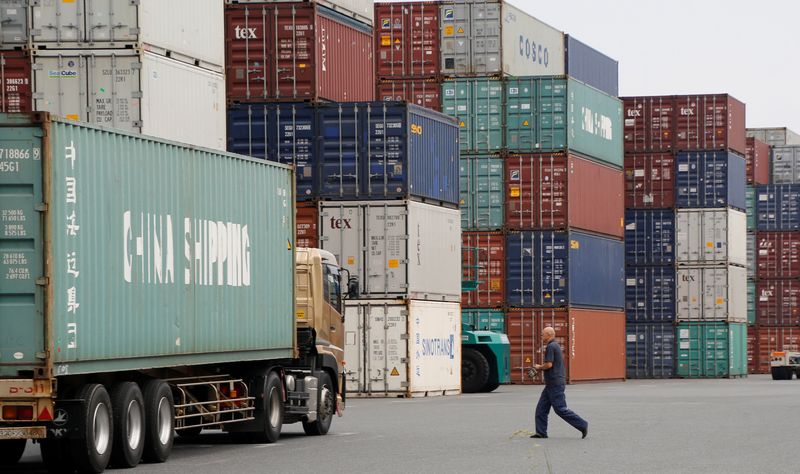By Tetsushi Kajimoto
TOKYO (Reuters) - Japan's export growth slowed sharply in December as China-bound shipments fell for the first time in seven months, stoking fears of further slowdown in the global economy and external demand for Japanese shipments.
Exports rose 11.5% year-on-year in December after a gain of 20% in November, marking the slowest growth since the start of 2022, dragged down by a fall-off in sales to China of cars, auto parts and chip-making machinery, Ministry of Finance (MOF) data showed on Thursday.
The weak data dashes policymakers' hopes for an export-led recovery from the coronavirus pandemic, putting more pressure on the government to persuade Japanese firms to accelerate wage hikes to help boost domestic demand.
Exports to largest trading partner China fell 6.2% year-on-year in value and were down 24% in volume terms in December.
Exports to the United States in December rose 16.9% from a year ago, led by cars, mining equipment and aero-engine parts.
"The unexpected stalling of the Chinese economy came on top of slowdown in Europe and America. In the worst case, it may deal a blow to Japanese exports, which could in turn hit Japan's factory output and capital expenditure," said Atsushi Takeda, chief economist at ITOCHU Research Institute.
"Japan would then have no choice but turn to domestic demand to pick up the slack. In that sense, spring wage talks between labour and management holds the key to see whether private consumption will hold up to drive virtuous economic growth."
Economic activity has been hampered in China by a wave of COVID-19 infections after the government began dismantling its stringent "zero-COVID" controls in December.
Although China's latest wave is expected to have faded by spring, the world's second largest economy will take time to return to pre-pandemic levels and risks of further COVID waves remain, Takeda said.
RECORD TRADE DEFICIT
The trade data also highlighted the challenge of a resource-deficient country that relies heavily on imports of commodity and energy, which also got a boost in value by the yen's 19.5% fall versus the dollar on average last year.
Imports grew 20.6% in value terms, led by oil, coal and liquefied natural gas, driving cost-push inflation that will raise the cost of living and the price of doing business, potentially harming demand in the economy.
The rises in exports and imports were largely in line with forecasts by economists in a Reuters poll.
As a result, December's trade deficit came to 1.45 trillion yen ($11.29 billion), extending the run of deficits to 17 months.
For the whole of 2022, Japan logged a trade deficit of 19.97 trillion yen, the second straight annual shortfall and the biggest since 1979.

"Trade deficits will stay at high levels even as import growth slows with oil prices falling and weak yen running its course. That's because exports remain weak due to lacklustre global demand," said Taro Saito, executive research fellow at NLI Research Institute.
($1=128.4300 yen)